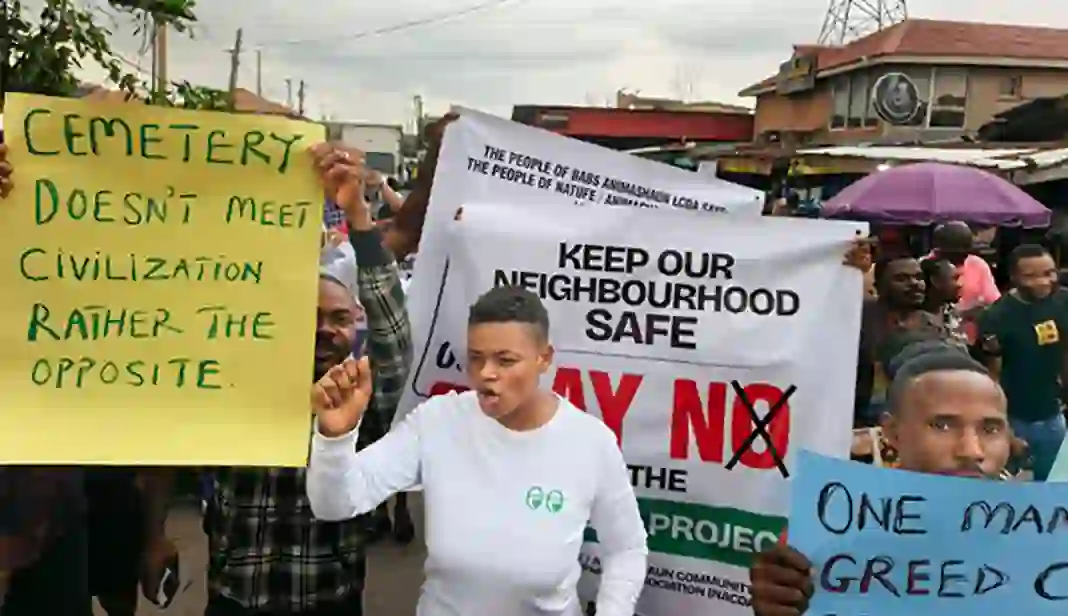Africa
Inadvisability Of Siting Cemeteries In Residential Communities -Isaac Asabor
The government must not ignore science, culture, and common sense. Because once the groundwater is poisoned and the peace of mind of residents is disturbed, no protest, and no prayer, can purify it.

When residents of Natufe Estate and its surrounding neighbourhoods in Surulere recently took to the streets under heavy rainfall to protest the proposed siting of a cemetery in their midst, they were not being dramatic, they were being sensible, informed, and rightly protective of their health, environment, and property.
The idea of placing a cemetery within a densely populated area like Surulere, bordered by homes, schools, churches, and businesses, is more than bad urban planning; it is a potential public health disaster waiting to happen. The World Health Organization (WHO) has repeatedly warned that cemeteries, if poorly located or managed, can contaminate groundwater and expose nearby residents to waterborne diseases such as cholera, dysentery, and hepatitis.
Let us be clear: decomposing human remains do not just vanish harmlessly into the earth. They release bodily fluids and toxic substances, what environmental scientists call “leachate”, which can infiltrate groundwater systems, especially in waterlogged or flood-prone areas. Surulere fits that bill perfectly. The area’s poor drainage and frequent flooding mean any seepage from gravesites could easily mix with borehole water, turning what should sustain life into a source of illness.
The WHO’s environmental health guidelines are not ambiguous on this issue. They explicitly recommend that cemeteries should not be sited in areas with high groundwater tables or near drinking water sources. They also advise maintaining a safe buffer zone, ideally 500 metres or more, between cemeteries and residential buildings. However, as is typical in Nigeria, these global best practices are often disregarded in favour of hurried approvals, opaque land deals, and politically motivated projects.
Beyond the science, there is also the matter of community psychology and socioeconomic stability. Living beside a cemetery is not merely unsettling; it is economically damaging. Real estate experts estimate that property values near burial grounds can plunge by as much as 60 percent. No family wants to raise children or invest in a property next to rows of graves. Businesses will leave. Schools will lose students. In addition, an already struggling community will face another layer of decline.
However, there is another dimension that urban planners and policymakers often dismiss, the psychological and cultural fear of ghosts. Like it or not, most Nigerians, regardless of education or religion, still hold deep-seated beliefs about the spirit world. For many residents, the thought of sleeping a few metres away from the dead is not just uncomfortable, it is terrifying.
Fear of ghosts, apparitions, and spiritual disturbances is not a matter of mere superstition; it is a cultural reality that shapes human behaviour and mental health. People who live close to cemeteries often report sleep disturbances, anxiety, and a persistent sense of unease. Parents worry about children walking past graveyards at night. Women returning from late church services feel unsafe. Even if no “ghosts” appear, the psychological weight of living beside graves can take a toll on community wellbeing.
Sociologists have observed that areas surrounding cemeteries often experience social withdrawal and reduced nighttime activity because residents instinctively avoid going out after dark. The fear of encountering restless spirits or hearing eerie sounds becomes part of daily life. This constant psychological pressure can slowly erode a community’s sense of peace and safety.
Moreover, cemeteries in urban centres often become flashpoints for insecurity and ritual activities, particularly at night. For a city like Lagos, already battling urban crime and inadequate policing, introducing another potential zone of vulnerability is reckless governance.
The truth is simple: cemeteries belong on the outskirts of cities, in properly zoned and environmentally tested areas, not within the living spaces of ordinary citizens. This is not a case of superstition versus science; it is one where both align. The science warns of water contamination and disease; the culture warns of fear and spiritual disturbance. Together, they make an overwhelming case against building cemeteries inside residential zones.
The Lagos State Government must tread carefully here. Silence in the face of growing community outrage sends the wrong message, that profit and convenience outweigh public welfare. It must immediately halt any ongoing construction, commission an environmental impact assessment, and engage genuinely with residents rather than imposing a project they clearly reject.
Urban planning should be about protecting life, not endangering it, physically, mentally, or spiritually. To build a cemetery in the heart of Surulere is to disregard every lesson from public health authorities and every warning from the people who actually live there.
The government must not ignore science, culture, and common sense. Because once the groundwater is poisoned and the peace of mind of residents is disturbed, no protest, and no prayer, can purify it.
























